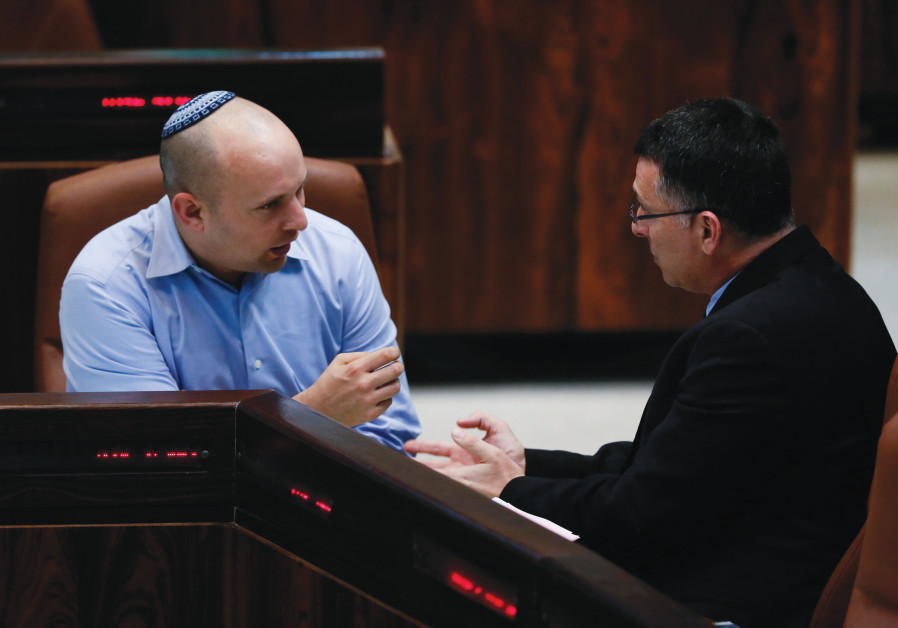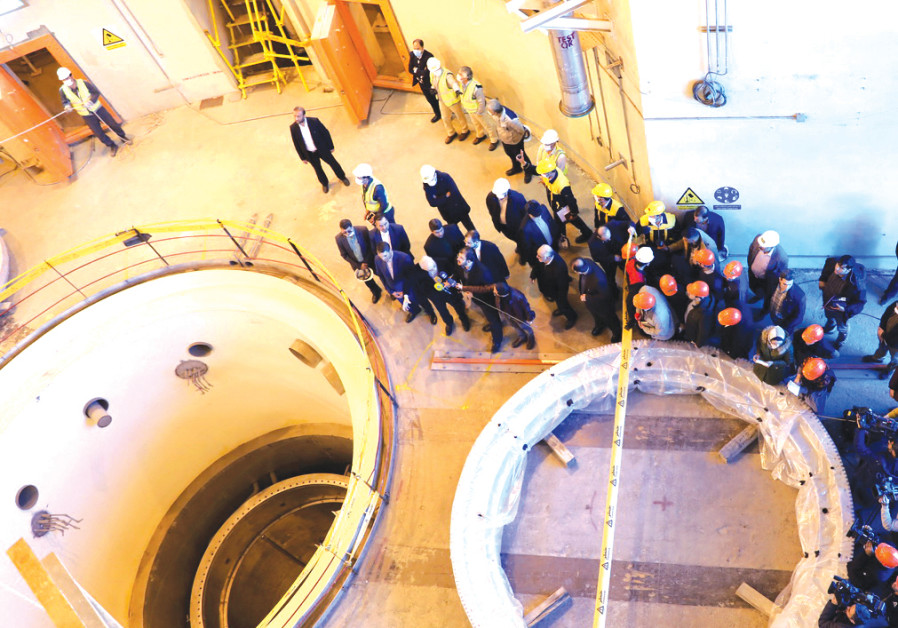Prime Minister Benjamin Netanyahu is known for his smart political maneuvering that has helped make him the longest-serving prime minister in Israel’s history.But has he finally met his match in prime ministerial hopeful and former Likud cabinet minister Gideon Sa’ar?Last month, Sa’ar outmaneuvered Netanyahu, bringing down his government by helping prevent the Knesset from extending the deadline for passing the state budget. Now, Sa’ar – as head of the New Hope Party – is intent on preventing Netanyahu from forming another government ever again. In an interview with the Magazine this week in his modest Tel Aviv living room, with his children and dog climbing around him, Sa’ar recounted what happened that night and outlined his plan to capture the premiership.“I won’t deny that I was very involved in the effort to end the farce of this ridiculous government that was going to pass a laughable bill to artificially extend its tenure for two weeks,” Sa’ar said. “Every Israeli patriot would work to end this failed government. I did everything necessary to make sure the coalition would not obtain a majority in the vote, and they indeed did not receive a majority in the vote.”Now it is Sa’ar who is working to ensure he will have a majority to build his own government after the March 23 election and based on his political career until now, he might have a chance. BORN IN 1964, Sa’ar entered politics in 1999 serving as Cabinet secretary in Netanyahu’s first government and then becoming a Likud MK in 2002. He remained loyal to the Likud and Netanyahu even after the prime minister led the party to a historic loss in the 2006 elections. When Netanyahu returned to power in 2009 as Israel’s prime minister, Sa’ar was right at his side, serving in top ministerial positions – education and interior – and as a member of the inner security cabinet. In 2014, a year after marrying popular news anchor Geula Even, Sa’ar announced his resignation from politics and proceeded to take a hiatus from politics, returning in 2018 and running for the party leadership a year later. Although he was soundly defeated by Netanyahu who took 72% of the vote, Sa’ar did something no one else in the Likud had succeeded in doing since 2009 – setting himself up as a possible heir apparent to the Likud throne the day after Netanyahu. All of the above, he is certain, have prepared him to take the reins of the country, which he said is in dire need of new leadership. “Today, Israel needs unity and stability,” he said when announcing his new party. “Netanyahu can’t and won’t be able to provide either.”While the objective is clear – replace Netanyahu – the path is complicated and whether he can retain and gain new support on the campaign trail remains to be seen. ![‘I WILL have an effective dialogue with the Biden administration – even better than [Prime Minister Benjamin] Netanyahu.’ (Pictured: The PM with President-elect Joe Biden in 2016 (Debbie Hill/Pool/File Photo/Reuters)](https://images.jpost.com/image/upload/f_auto,fl_lossy/t_Article2016_ControlFaceDetect/466046) Politically, while Sa’ar has bona-fide right-wing credentials – he makes a point of stressing that while Netanyahu voted in favor of the Gaza Strip disengagement, he opposed it in every vote – it hasn’t stopped the Likud from trying to portray him as left-wing. Speaking a day after both Blue and White leader Benny Gantz and Israelis Party leader Ron Huldai called him “extreme Right,” Sa’ar vowed to not stoop to responding. “I won’t join the mudslinging,” he said. “I don’t respond. I won’t be dragged into it.” Sa’ar said the public does not like negative attacks and noted that former prime minister Menachem Begin called voters “Your royal highness, the voter.” But he nevertheless responded.“They call me extreme Right, and Netanyahu calls me Left, but the average between them may be what is most correct,” he said. “I am the least extreme person in Israeli society, and the entire country knows it.”To that end, speculation has been raised that he would reach an agreement with fellow prime ministerial hopeful Naftali Bennett ahead of the February 4 deadline to have their New Hope and Yamina parties run together on a joint slate. That speculation intensified after it became apparent that Bennett would not run together with the more fervent religious-Zionist Party of MK Bezalel Smotrich (formerly the National Union).A poll taken last week found that if the two parties ran together, they would win 29 seats, just two less than Netanyahu’s Likud. Nevertheless, Sa’ar downplayed that possibility in the interview. “I don’t intervene between Bennett and Smotrich,” he said. “In the past two years, they united and broke up several times. I wouldn’t hurry to estimate how the current round will end. I don’t deal with hypotheticals.” Sa’ar said he respected Bennett and sees him as a potential partner in the future but adds that “everyone who follows what Bennett has been saying sees he is not as obligated to replace the government” and that such a commitment is integral for a potential alliance. “What is in common among those who go with us must be the understanding that it is essential to replace the government at this historical juncture,” he said. He added more definitively to other media that he has not been persuaded that running together with Yamina would add mandates to his camp. Regarding Bennett saying Netanyahu should be replaced but not ruling out joining a government led by him, Sa’ar said: “You cannot be bald and also have curls.” Sa’ar said his New Hope party is already a political merger, because it includes four MKs from the Likud in former minister Ze’ev Elkin, former MKs Sharren Haskel and Michal Shir and himself; one from former finance minister Moshe Kahlon’s Kulanu in Yifat Shasha Biton; two from Derech Eretz in Yoaz Hendel and Zvi Hauser; and new voices like Eilat mayor Meir Yitzhak Halevy and prime minister Yitzhak Shamir’s granddaughter, attorney Michal Diamant. “I WANT a heterogeneous list, with people who are fitting,” he said. “I have been meeting people, mostly from outside politics, from different fields of work. I am not looking for candidates on the Left, because our party is Center-Right. Our candidates are Center and Right. I belong to the pragmatic Right.”
Politically, while Sa’ar has bona-fide right-wing credentials – he makes a point of stressing that while Netanyahu voted in favor of the Gaza Strip disengagement, he opposed it in every vote – it hasn’t stopped the Likud from trying to portray him as left-wing. Speaking a day after both Blue and White leader Benny Gantz and Israelis Party leader Ron Huldai called him “extreme Right,” Sa’ar vowed to not stoop to responding. “I won’t join the mudslinging,” he said. “I don’t respond. I won’t be dragged into it.” Sa’ar said the public does not like negative attacks and noted that former prime minister Menachem Begin called voters “Your royal highness, the voter.” But he nevertheless responded.“They call me extreme Right, and Netanyahu calls me Left, but the average between them may be what is most correct,” he said. “I am the least extreme person in Israeli society, and the entire country knows it.”To that end, speculation has been raised that he would reach an agreement with fellow prime ministerial hopeful Naftali Bennett ahead of the February 4 deadline to have their New Hope and Yamina parties run together on a joint slate. That speculation intensified after it became apparent that Bennett would not run together with the more fervent religious-Zionist Party of MK Bezalel Smotrich (formerly the National Union).A poll taken last week found that if the two parties ran together, they would win 29 seats, just two less than Netanyahu’s Likud. Nevertheless, Sa’ar downplayed that possibility in the interview. “I don’t intervene between Bennett and Smotrich,” he said. “In the past two years, they united and broke up several times. I wouldn’t hurry to estimate how the current round will end. I don’t deal with hypotheticals.” Sa’ar said he respected Bennett and sees him as a potential partner in the future but adds that “everyone who follows what Bennett has been saying sees he is not as obligated to replace the government” and that such a commitment is integral for a potential alliance. “What is in common among those who go with us must be the understanding that it is essential to replace the government at this historical juncture,” he said. He added more definitively to other media that he has not been persuaded that running together with Yamina would add mandates to his camp. Regarding Bennett saying Netanyahu should be replaced but not ruling out joining a government led by him, Sa’ar said: “You cannot be bald and also have curls.” Sa’ar said his New Hope party is already a political merger, because it includes four MKs from the Likud in former minister Ze’ev Elkin, former MKs Sharren Haskel and Michal Shir and himself; one from former finance minister Moshe Kahlon’s Kulanu in Yifat Shasha Biton; two from Derech Eretz in Yoaz Hendel and Zvi Hauser; and new voices like Eilat mayor Meir Yitzhak Halevy and prime minister Yitzhak Shamir’s granddaughter, attorney Michal Diamant. “I WANT a heterogeneous list, with people who are fitting,” he said. “I have been meeting people, mostly from outside politics, from different fields of work. I am not looking for candidates on the Left, because our party is Center-Right. Our candidates are Center and Right. I belong to the pragmatic Right.”  Sa’ar said all the candidates who joined him took a risk, including himself. He quit before it was clear the Knesset would be dispersed, and he could have waited for the post-Netanyahu era to run. He said he has been encouraged by the response of the public to his new party, which he noted cannot be taken for granted.“Our potential is very significant,” he said. “We have gotten support from the public, even though we are a new party. Other new parties are below the threshold. The public realizes the authenticity and seriousness of the step we took.” Cooperating with other parties after the election is different, he said. That will depend on the results of the election and the approach of each party. “Today, we are asking for the trust of the public as the only party that can replace the government,” he said.“The others tried a number of times to replace the government and failed or didn’t even try. I will try to build a coalition and a government. I believe that most Israelis today want change, and our role in the election is to make it clear that any vote other than for New Hope can harm the effort to replace the government and keep Netanayhu in power.”A bloc is expected to be built on the Center-Left led by Yesh Atid leader Yair Lapid. Sa’ar did not sound concerned by that possibility.“I don’t think Lapid can [build a coalition], and not just because of his [poor] relations with the haredim,” Sa’ar said. “He is too Left of Center. He cannot achieve a majority in the Knesset. To be polite I’d say his chances are slim, but to be real I’d say they’re nonexistent.
Sa’ar said all the candidates who joined him took a risk, including himself. He quit before it was clear the Knesset would be dispersed, and he could have waited for the post-Netanyahu era to run. He said he has been encouraged by the response of the public to his new party, which he noted cannot be taken for granted.“Our potential is very significant,” he said. “We have gotten support from the public, even though we are a new party. Other new parties are below the threshold. The public realizes the authenticity and seriousness of the step we took.” Cooperating with other parties after the election is different, he said. That will depend on the results of the election and the approach of each party. “Today, we are asking for the trust of the public as the only party that can replace the government,” he said.“The others tried a number of times to replace the government and failed or didn’t even try. I will try to build a coalition and a government. I believe that most Israelis today want change, and our role in the election is to make it clear that any vote other than for New Hope can harm the effort to replace the government and keep Netanayhu in power.”A bloc is expected to be built on the Center-Left led by Yesh Atid leader Yair Lapid. Sa’ar did not sound concerned by that possibility.“I don’t think Lapid can [build a coalition], and not just because of his [poor] relations with the haredim,” Sa’ar said. “He is too Left of Center. He cannot achieve a majority in the Knesset. To be polite I’d say his chances are slim, but to be real I’d say they’re nonexistent.
“Lapid has been trying to replace the government since 2013. Five times he tried and failed. There is no proof that the sixth time will work. I am the only one who can replace Netanyahu.” REGARDING HULDAI, he said “a party not crossing the threshold insulting a larger party shows an extreme lack of self-awareness.” He said Huldai has been a good mayor and that when he endorsed Huldai’s mayoral campaign in the past, the mayor welcomed the endorsement and did not dismiss him as an extremist. “What he is saying needs to be seen as an expression of a man who is in a difficult situation trying to cross the threshold and trying to get attention with attacks on other candidates,” he said. “Too bad. He just started, so he should talk about himself and his candidacy.”
![‘I WILL have an effective dialogue with the Biden administration – even better than [Prime Minister Benjamin] Netanyahu.’ (Pictured: The PM with President-elect Joe Biden in 2016 (Debbie Hill/Pool/File Photo/Reuters)](https://images.jpost.com/image/upload/f_auto,fl_lossy/t_Article2016_ControlFaceDetect/466046)



